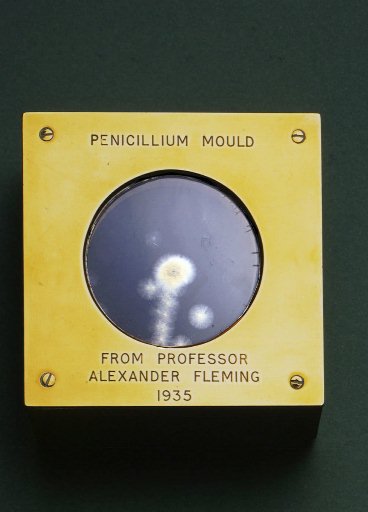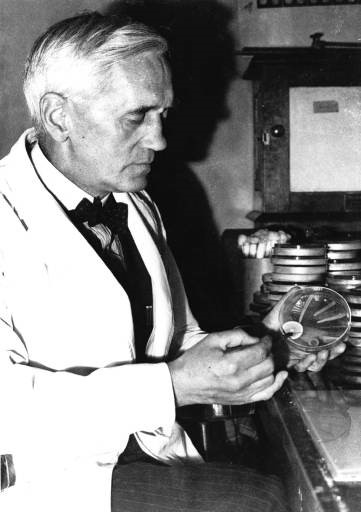Penicillin By

A penicillium mould, mounted in a glazed wooden box belonging to bacteriologist Alexander Fleming fetched a high price at a Christie’s auction Friday July 11 1997.The Science Museum paid 14,950 pounds ( about dlrs 25,300) for the specimen,which led to the discovery of penicillin.(AP PHOTO/PA)*UNITED KINGDOM OUT*

Alexander Fleming, at work with a penicillin mold in his London laboratory, on Sept. 17, 1943. He discovered penicillin in 1928. (AP PHOTO)
Amanda Mannis
Definition and background
Penicillins are a category of antibiotics that come from the Penicillium mold and is used to treat and fight bacterial infections in various parts of the body including meningitis, syphilis, and urinary tract infections. There are many numerous types of penicillins that come from different species of the Penicillum mold. Other derivatives of penicillin include amoxicillin, ampicillin, and flucloxacillin (Martin, Oxford Reference, 2015). However the various types are categorized into two main groups. The first group is characterized by its formation through the naturally occurring anaerobic process of fermentation while the second is characterized by being synthetically produced. (Rogers, Britannica Academic, 2009). Penicillin works by prohibiting the bacterial cell wall from formation or the degradation of it. (Martin, Oxford Reference, 2015).
The discovery of penicillin was accidentally. Penicillin was discovered September 1928 when bacteriologist Alexander Fleming realized his culture plate of Staphylococcus aureus had been contaminated and overtaken by fungus or mold. With the help of other researchers in his lab, Fleming further examined and isolated the culture growth and realized they were on to something—discovering one of the first antibiotics to change the realm of medicine. Fleming went on earn and share the 1945 Noble Prize with Howard Florey and Ernst Chain who were instrumental in the use of penicillin in World War II (Rogers, Britannica Academic, 2009). During World War II, penicillin was offered at a low cost to soldiers which reduced the number of deaths due to infectious diseases and wounds such as gonorrhea and syphilis. Additionally, penicillin gave hope to post-war recovery for those affected by such diseases. The discovery of penicillin during World War II impacted the relationship between the government, private industry, and funding for medical research (Kardos & Demain, 2011, p.2)
Historical Context
Penicillin has truly changed the course of medicine. Alharbi et. al (2014) highlights some pivotal moments in history where Fleming influenced other scientists persist and expand in their own scientific endeavors. The article first discusses penicillin in the 1930s in Sheffield, England. During this time Cecil Paine used filtrates, which were filters that allowed liquid to flow and reach bacterial-infested bodily regions. However Paine combined his knowledge of filtrates and experience with working alongside Fleming to come up with a penicillin filtrate to cure infections. His filtrate was unsuccessful in the treatment of skin infections yet persistent Paine used the filtrate on eye infections in a coal miners and babies and in all cases the penicillin filtrate worked. Paine later went onto save the eyesight of many patients during this time.
Fleming also influence his other lab comrades, Howard Florey and Ernst Chain who were also a part of the Oxford Group and the same couple who went on to earn the Noble Prize alongside Fleming. So if Fleming had not discovered penicillin would Florey and Chain likely to? Many scholars claim no. For the Oxford Group did not take recognized penicillin until Chain was researching naturally occurring antibacterial agents which led him to stumbled upon Fleming’s work. And as history goes penicillin was later used by Chain and Florey to help American soldiers who had contracted bacterial infections on the battlefields during World War II. (Alharbi et. al, 2014)
Lastly, Fleming’s discovery also influenced the work of Selman Waksman who discovered the antibiotic streptomycin, an antibiotic that was effective in treating tuberculosis a highly contagious and deathly disease in the 1940s and 1950s. Waksman was motivated by what “these English scientists are doing with penicillin” (Alharbi et al., 2014)
Controversy/Perspectives
Although penicillin is linked to saving the lives of those with bacterial infections, penicillin is connected to one of the most controversial clinical studies that has taken place in the United States—the Tuskegee Syphilis Experiment (1932-1972). The Tuskegee Syphilis Experiment was conducted by the U.S. Public Health Services (USPHS) in the south, in Tuskegee, Alabama to see what percentage of the black male population has syphilis. The USPHS later returned in 1932 to see the evolution and spread of the disease. They recruited 600 in Tuskegee of this 399 had previously contracted syphilis and 201 did not have the disease. Because of a vast of the majority of the population were uneducated sharecroppers they were deceived by the US government and their local public health agencies such as Alabama State Board of Health and the Macon County Health Department. The African American community in Tuskegee were told that they were offering free health screenings along with free treatments. However, the experiment lost funding and did not inform the participants of the experiment that they would not be treated. This controversial clinical study is linked to penicillin for in 1947 this antibiotic was proven to treat and cure syphilis, despite this participants remained untreated. This case set a precedent for the questioning of ethical standards in scientific research (Martin, Oxford Reference, 2015). Now by law, experimenters must have informed consent and must communicate to participants what their study is intended to do (Martin, Oxford Reference, 2015).
Because of this controversial topic, many have claimed this is the reason African Americans (especially in southern, lower-class, rural areas) tend to have greater distrust in their physicians and are harder to recruit for clinical research. A 2001 study conduct by Freimuth et al. (2014) collected data to get African Americans perspective on healthcare providers as well as their views on the Tuskegee Syphilis Experiment. The study results showed important implications of African Americans patients. The study found “accurate knowledge about research was limited; lack of understanding and trust of informed consent procedures was problematic; and distrust of researchers posed a substantial barrier to recruitment” (Freimuth, 2001). Some interventions suggested were suggested to increase retention of African Americans in clinical research as well as increase trust in physicians. Some solutions included adopting more educational programs as well as have more outreach programs.
Correspondence to Politics of Health
Penicillin is linked to the politics of health through the concept of therapeutic citizenship. Therapeutic citizenship a term developed by Vinh-Kim Nguyen is “bio-political citizenship that includes claims and ethical projects that emerge from techniques to control and manage bodies” (Patterson, 2016, p. 1121). In World War II, soldiers had access to this life-saving drug through Fleming’s discovery. The government provided funding to further the research of penicillin to help aid wounded soldiers. Additionally, they subsided the cost of this antibiotic to ensure that their soldiers were healthy enough to fight and win the war.
However, closely tied with therapeutic citizenship is the term triage. Triage is prioritizing medical care for a certain group of individuals over another group. (McGough, 2012, p.697). In the Tuskegee Syphilis Experiment we seen that penicillin was not made accessible to victims suffering with syphilis. Although not explicitly stated, it is inferred because demographically Tuskegee was composed of lower-income African-Americans this is the reason the government was slowed about getting involved in the case. Contrasting, World War II the government did not benefit from healing those in Tuskegee as they did with soldiers in World War II. However, ethically race and ethnicity, and/or mutualism should not be a determining factor whether people receive medical treatment.
References:
Alharbi, Sulaiman Ali, Milton Wainwright, Tahani Awad Alahmadi, Hashim Bin Salleeh, Asmaa A. Faden, and Arunachalam Chinnathambi. “What If Fleming Had Not Discovered Penicillin?” Saudi Journal of Biological Sciences 21, no. 4 (September 1, 2014): 289–93. Accessed January 24, 2017. doi:10.1016/j.sjbs.2013.12.007. http://www.sciencedirect.com/science/article/pii/S1319562X14000023
Freimuth, Vicki S, Sandra Crouse Quinn, Stephen B Thomas, Galen Cole, Eric Zook, and Ted Duncan. “African Americans’ Views on Research and the Tuskegee Syphilis Study.” Social Science & Medicine 52, no. 5 (March 1, 2001): 797–808. Accessed January 24, 2017. doi:10.1016/S0277-9536(00)00178-7. http://www.sciencedirect.com.proxy.library.vanderbilt.edu/science/article/pii/S0277953600001787?np=y.
Kardos, N. & Demain, A.L. Appl Microbiol Biotechnol (2011) 92: 677. doi:10.1007/s00253-011-3587-6
Martin, Elizabeth. Oxford Reference. Rennie, Richard. “Penicillin.” April 19, 2016. Accessed January 23, 2017. http://www.oxfordreference.com.proxy.library.vanderbilt.edu/view/10.1093/
McGough, Laura. “The Republic of Therapy: Triage and Sovereignty in West Africa’s Time of AIDS.” Bulletin of the History of Medicine 86 (2012): 697-698, accessed February 26, 2017. https://search-proquest-com.proxy.library.vanderbilt.edu/docview/1288084366/23503BB352264B7PQ/1?accountid=14816.
Patterson, Amy. (2016) Training Professionals and Eroding Relationships: Donors, Aids Care and Development in Urban Zambia. Journal of International Development 28:6, pages 827-844.
CrossRef
Rogers, Kara. 2009 Britannica Academic, s.v. “Penicillin” accessed January 23, 2016. http://academic.eb.com.proxy.library.vanderbilt.edu/levels/high/article/59068
« Back to Glossary Index